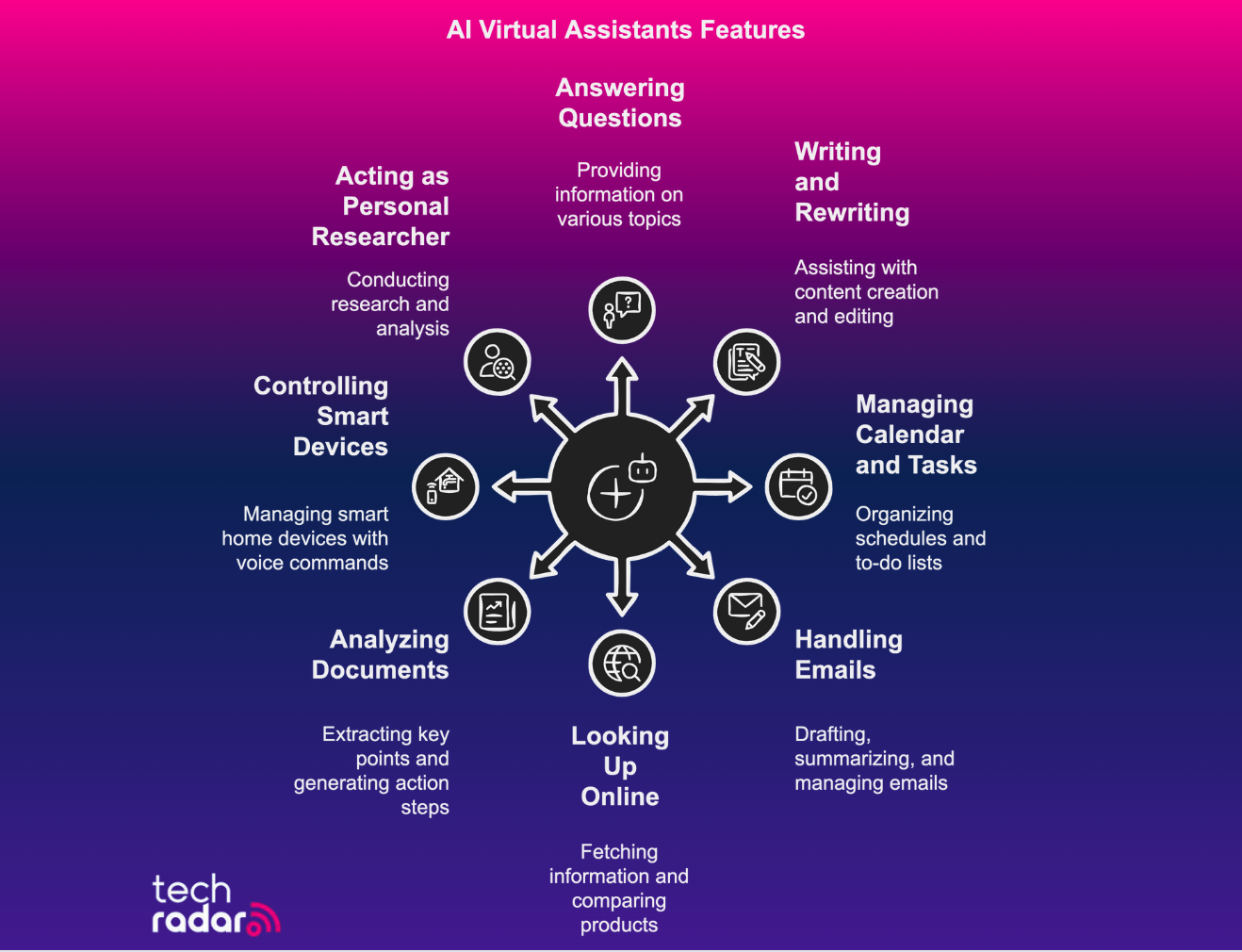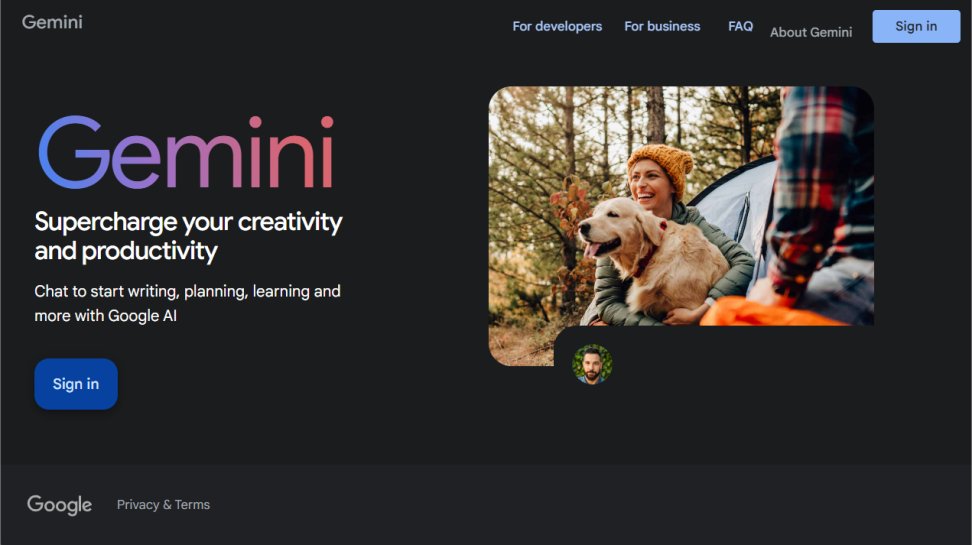Sponsored by Google Workspace
How to choose the perfect AI assistant for your business
There are a lot of choices. Here's how to determine which one is best for your business

In today’s business environment, Artificial Intelligence (AI) assistants have become essential tools for managing regular everyday operations.
These AI tools help improve efficiency and productivity, enhancing experiences for both customers and employees. They can streamline repetitive tasks and provide real-time insights, changing how businesses operate.
However, with many options available, choosing the right AI assistant for your specific needs can be challenging. This article is designed to simplify the decision-making process by outlining key steps and factors to consider.
By the end, you will be able to make a well-informed choice that maximizes your investment in AI, supporting your growth and success.
Your Complete Productivity Suite. Email, Docs, Meetings, and AI in One Place. Upgrade to Google Workspace and save 15% on Starter, Standard and Plus for 12 months (Flex & Commit).
Techradar Pro Approved Sponsored Offer
Why your business needs an AI assistant
To select among the best AI assistants, you need to identify how these tools can enhance operational efficiency. The deployment of AI assistants leads to significant improvements in efficiency and substantial productivity gains.
Your team can achieve better results by leveraging AI assistants to perform routine tasks, allowing them to focus on strategic tasks that produce genuine value.
AI assistants deliver a valuable benefit through their continuous availability for twenty-four hours. AI-powered chatbots with virtual assistance capabilities provide constant support through automated responses for basic queries and common issues.
At the same time, they handle complex matters by transferring them to human agents. Continuous customer service improvement can result from this type of operational availability.
Cost savings prove essential in this scenario. AI assistants generate operational savings for businesses by automating tasks, enabling organizations to avoid incurring additional staff costs as they expand their operations.
AI assistants also help organizations make better decisions by analyzing extensive data collections that reveal patterns and system bottlenecks, and by creating forecasting reports.
They deliver consistent accuracy by offering pre-trained responses that minimize errors and maintain brand consistency in compliance-heavy industries. The implementation of AI assistants streamlines processes between different organizational departments, including sales, marketing, human resources, and IT, to create more efficient workflows and enhance lead qualification processes, expense management, and onboarding support.
Organizations can improve operational efficiency through AI assistant implementation, which simultaneously enhances customer satisfaction.
To initiate the selection process, it is necessary to understand how AI assistants offer multiple advantages to businesses.

The primary benefit of AI assistants stems from their ability to improve operational efficiency.
AI assistants perform routine tasks such as data entry, scheduling, and information retrieval, freeing up human personnel to focus on strategic and creative tasks.
AI-powered chatbots and virtual assistants provide continuous service to customers, operating 24 hours a day. AI tools handle basic queries through automated support systems and direct complex problems to human personnel who receive complete context information.
Key considerations when choosing an AI assistant
A strategic selection of AI assistants requires organizations to match their business objectives with their existing infrastructure. Your first step should involve precisely identifying your organizational and functional requirements.
Your organization needs to identify its primary operational challenges, which may include repetitive tasks that consume excessive time or an overwhelmed customer service team. Determine which departments will benefit most, such as customer service, HR, or sales, and establish measurable objectives like reducing wait times or improving employee satisfaction.
Assess the essential features and capabilities of potential AI assistants during the evaluation process. The evaluation of potential AI assistants requires assessing their natural language processing (NLP) capabilities to understand complex queries and their machine learning (ML) capabilities for ongoing improvement.
The system must integrate seamlessly with your existing infrastructure while providing task automation features and robust data management capabilities. Security and privacy must be your top priority because you need to verify the data protection protocols that safeguard sensitive information.
The system must be adaptable to changing business requirements through scalable features that maintain an intuitive and easy-to-use interface.
You should evaluate your infrastructure and resources before making any commitment. The AI requires access to organized data that is ready for learning, and you need to verify that your current technology infrastructure supports smooth integration.
Evaluate your team’s capabilities—do you have the necessary expertise in-house, or will you need to seek external support? Your financial planning should include both initial expenses and future maintenance costs, as well as training expenses.
You should perform extensive vendor research to identify reputable providers, including Microsoft Copilot, Google Gemini, IBM Watson Assistant, and ChatGPT.
Test the solutions through demonstrations and trials to observe their performance in practical situations while seeking feedback from businesses operating in your industry.
A successful implementation depends on understanding the pricing models and hidden costs, as well as the level of support and updates provided by the vendor.
A brief look at what current AI assistants can do for businesses
Each AI assistant delivers exclusive capabilities to meet different business requirements, thereby boosting operational effectiveness and customer relationship management.
Microsoft Copilot
Microsoft Copilot is a feature of Microsoft 365 that enhances productivity levels for its users. Users benefit from the simplicity of document creation, thanks to innovative template suggestions and contextual tips that help produce reports and presentations more efficiently.
The summarization feature of emails enables users to understand long threads, promoting efficient and faster communication. Microsoft Teams users benefit from Copilot because it creates meeting agendas, then transcribes discussions and generates specific action items.
The workflow automation capabilities of Power Automate, combined with the human resources features for streamlined onboarding and performance reviews, help improve both collaboration and the effectiveness of customer service.

Google Gemini
The team collaboration features of Google Gemini operate as an embedded tool in Google Workspace, functioning as a collaborative partner for teams.
The system provides draft document assistance through content and formatting suggestions that optimize writing performance. The research tool Gemini searches multiple sources to create summaries, enabling users to make more informed decisions.
Virtual meetings become more effective through their note-taking capability, which automatically generates follow-up tasks. Through its quick data organization feature in Google Sheets, the system utilizes machine learning to develop personalized marketing proposals, thereby enhancing customer interaction and increasing conversion rates.
IBM Watson Assistant
IBM Watson Assistant enables the development of intelligent chatbots that enhance both internal organizational efficiency and external customer service delivery.
The assistant utilizes natural language processing (NLP) to comprehend interactions and learn from them, thereby delivering contextually relevant automated responses.
The business system connections of Watson provide immediate customer query resolution while upholding security standards and industry compliance requirements. The platform includes analytical tools that enable businesses to understand customer behaviors, allowing them to develop improved service offerings over time.
OpenAI ChatGPT
The OpenAI-developed ChatGPT stands out as a conversational AI system that demonstrates exceptional abilities in text creation alongside summary generation.
The platform delivers continuous customer service operations through its ability to manage both standard and advanced user inquiries. The platform helps developers through its coding support and troubleshooting resources.
Businesses can utilize the platform to develop GPTs tailored to their unique requirements, thereby enabling more effective user connections and automated workflows, while driving innovations in customer interaction.
A business must evaluate its current systems, together with operational requirements and customization preferences, when selecting an AI assistant.
These tools transform organizational operations and customer relationships while enabling businesses to adapt to digital changes. Organizations that effectively implement these AI assistants will gain operational efficiency, improve communication, and deliver superior services to their clients.
Conclusion
Selecting an appropriate AI assistant represents a strategic business decision that will significantly impact your company's future development.
The best selection requires you to establish your requirements, evaluate vendors and features, determine your available resources, and implement changes in stages.
Your organization can select an AI assistant that aligns with your operations, enabling your workforce and supporting long-term growth in the intelligence-driven market.
Sign up to the TechRadar Pro newsletter to get all the top news, opinion, features and guidance your business needs to succeed!
Bryan M. Wolfe is a staff writer at TechRadar, iMore, and wherever Future can use him. Though his passion is Apple-based products, he doesn't have a problem using Windows and Android. Bryan's a single father of a 15-year-old daughter and a puppy, Isabelle. Thanks for reading!

